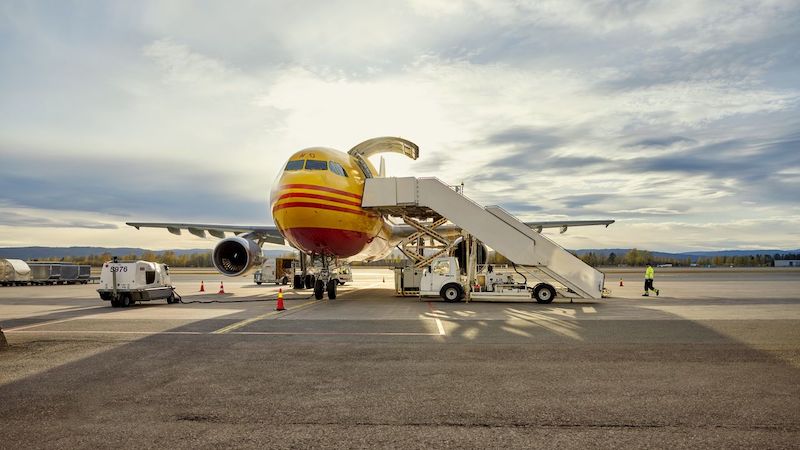Grow your business with the Discover newsletter
Logistics advice & insights straight to your inbox
Subscribe now
Sustainability is no longer just a buzzword; it has become a vital aspect of businesses and individual lives. With the growing concerns about climate change and environmental protection, reducing carbon emissions and minimising our carbon footprint has become essential. Recognising this, DHL Express Thailand is committed to leading the way in reducing carbon emissions. We help address sustainability head-on by educating our customers on how to reduce their carbon footprint when shipping packages domestically and internationally. Our goal is to make sure that companies in Thailand have access to strategies and resources they need in order to meet their sustainability goals while navigating today’s modern business landscape.
In this blog, we will discuss how companies can take advantage of DHL Express Thailand’s environmentally conscious services and commit to reducing their carbon output through shipping with us.
The importance of sustainable logistics and supply chain management cannot be overstated in addressing the carbon emissions and environmental pollution associated with the logistics industry. It is essential to consider the entire supply chain, from the sourcing of materials to the delivery of goods, in order to know how to reduce carbon footprint effectively.
For example, cargo ships play a significant role in imports and exports across the supply chain. As such, they rely heavily on fossil fuels, contributing to the release of carbon dioxide (CO2) and other greenhouse gases (GHG) into the atmosphere. This leads to the occurrence of the greenhouse effect – the way in which heat is trapped close to the Earth’s surface by greenhouse gases – which results in global warming. In fact, emissions from the international shipping sector grew by 5% in 2021, rebounding from the sharp decline in 2020, according to the International Energy Agency.
Sustainable logistics refers to the practice of integrating environmentally friendly and socially responsible principles into the entire logistics process, from sourcing and production to transportation and delivery. It involves minimising the environmental impact of logistics operations, reducing carbon emissions, optimising resource utilisation, and promoting ethical practices within the supply chain.
This includes adopting energy-efficient transportation methods, implementing green packaging solutions, optimising routing and scheduling for minimal fuel consumption, and embracing technologies that enhance efficiency and reduce waste. By embracing sustainable logistics practices, companies can reduce their carbon footprint, enhance their reputation, and contribute to a more sustainable and resilient future.

When it comes to reducing carbon emissions and promoting sustainability in shipping, DHL Express Thailand is at the forefront with its innovative service, GoGreen Plus. This comprehensive solution goes beyond traditional carbon offsetting and offers a range of tools and initiatives to help businesses effectively reduce their carbon footprint and contribute to environmental protection.
To understand how GoGreen Plus works, it's important to distinguish between two key concepts: insetting and offsetting.
The meaning of offsetting involves investing in projects that reduce or remove an equivalent amount of carbon emissions from the atmosphere. In contrast, insetting focuses on reducing emissions within the company's own operations and supply chain.
GoGreen Plus incorporates carbon insetting to effectively reduce carbon emissions. DHL Express Thailand achieves this through various initiatives such as optimising transportation routes, utilising energy-efficient vehicles and embracing sustainable aviation fuels (SAFs).
By using SAFs, DHL Express Thailand reduces greenhouse gas emissions associated with our air cargo operations. SAFs are derived from renewable feedstocks and have a significantly lower carbon footprint compared to traditional aviation fuels.
This proactive approach to carbon insetting allows DHL Express Thailand to take direct action in minimising emissions, contributing to a greener and more sustainable shipping industry.
One of the key features of GoGreen Plus is the emphasis on sustainable logistics and supply chain management. DHL Express Thailand understands the significance of considering the entire supply chain in greenhouse gas (GHG) emission reduction efforts. This includes addressing emissions within the three scopes: Scope 1, Scope 2, and Scope 3 – a classification system developed by the GHG Protocol.
This refers to direct GHG emissions generated from owned or controlled sources. In the context of shipping, it includes GHG emissions from company-owned vehicles and equipment. DHL Express Thailand actively works to reduce these GHG emissions by optimising its fleet and adopting energy-efficient vehicles and equipment.
This encompasses indirect GHG emissions resulting from the generation of purchased energy, such as electricity. DHL Express Thailand promotes the use of renewable energy sources, such as solar power, to minimise its Scope 2 GHG emissions and ensure a cleaner energy supply for its operations.
These are indirect GHG emissions that occur as a result of business activities but are not directly owned or controlled by the company. What is an example of a scope three carbon emission? In shipping, Scope 3 emissions can include emissions from overseas business trips, disposal of sold products and waste generated in day-to-day operations.
Through the increased usage of sustainable aviation fuels (SAF), construction of new carbon-neutral buildings, electrifying 60% of the last-mile delivery and more, DHL Express Thailand aims to achieve net-zero emissions by 2050.
By choosing GoGreen Plus, shippers can demonstrate their commitment to environmental protection, enhance their sustainability credentials and contribute to a greener future. DHL Express Thailand is dedicated to supporting businesses in their sustainability journey and is ready to assist them in implementing effective carbon emission reduction strategies.
Reducing carbon emissions is an urgent global priority, and the logistics industry plays a vital role in achieving this goal. DHL Express Thailand, as a leader in the logistics sector, is dedicated to minimising carbon emissions and promoting sustainability through its GoGreen Plus service.
By combining accurate carbon footprint calculation, active emission reduction measures, and certified carbon offsetting, GoGreen Plus provides shippers with a comprehensive solution to reduce their carbon footprint. Open a business account with us today and learn how to embrace sustainable logistics practices to work towards a greener future.